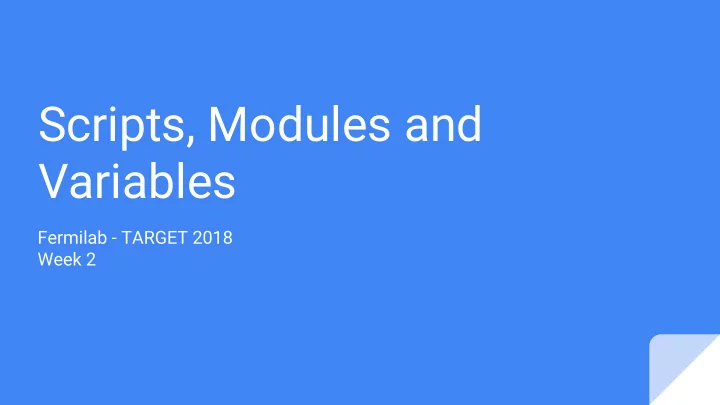

Scripts, Modules and Variables Fermilab - TARGET 2018 Week 2
Python script #! - shebang #!/usr/bin/python import os Indicates which interpreter import sys Import statements can run the script import string import optparse to use other modules ... from glideinwms.lib import condorExe Block # Main function def main(argv): Groups together a list of Comments feconfig=frontenvparse.FEConfig() # FE configuration holder statements … # parse arguments Starting with # feconfig.config_optparse(argparser) 4 spaces indentation! (options, other_args) = argparser.parse_args(argv[1:]) if len(other_args)<1: Function raise ValueError, "Missing glidein_name" glidein_name = other_args[0] Gives a name to a block of if len(other_args)>=2: log_type=other_args[1] code and hides variables else : log_type= "STARTD" Outside statements ... return 0 Executed when running the __main__ # S T A R T U P script if __name__ == '__main__' : Value of __name__ when try : sys.exit(main(sys.argv)) this is invoked as a script except Exception, e: (as alternative could be sys.stderr.write( "ERROR: Exception msg %s\n" %str(e)) sys.exit(9) imported)
Structuring files Module - single file of Python code (definitions and statements) that is meant to be imported Package - collection of Python modules under a common namespace. In practice one is created by placing multiple python modules in a directory with a special __init__.py module (file) Library - generic term for code that was designed with the aim of being usable by many applications. PYTHONPATH lists known libraries. Standard library - collection of exact syntax, token and semantics of the Python language which comes bundled with the core Python distribution (>200 modules)
Variable Variables are used to store information to be referenced and manipulated in a computer program Variables have a name, value, representation, a type
Variables scope and lifetime Scope - part of a program where a variable is accessible Lifetime - duration for which the variable exists Global variable - defined in the main body of a file It will be visible throughout the file, and also inside any file which imports that file. Local variable (to a function) - defined inside the function It is accessible from the point at which it is defined until the end of the function, and exists for as long as the function is executing.
Variable lifetimes and scopes, an example Lifetime (memory used) Scope (name can be used) a b c d a(loc) a b c d a(loc) # This is a global variable a = 0 Global Variables if a == 0: Defined outside: a, b # This is still a global variable, becomes alive only if a is 0 b = 1 def my_function(c): # This is a local variable Local variables d = 3 To my_function: c, d, a(loc) print(c) print(d) # This is a local variable too, hiding the global a a = 5 print(a) # Now we call the function, passing the value 7 as the first and only parameter my_function(7) # This prints 7, 3, 5 # a and b still exist print(a) # This prints 0, the value of the global a Error! print(b) You cannot refer # c and d don't exist anymore -- these statements will give us name errors! (local) variables print(c) outside their scope print(d)
Knowing how to code may come handy... Remember to choose a project for your presentation! Here a creative example of someone using coding abilities to solve a problem Project Mayhem writing some code to fight fake IRS phone scam: https://www.youtube.com/watch?v=EzedMdx6QG4
Recommend
More recommend